Introduction
Call of Duty: Modern Warfare 2 (MW2), released in late 2022, is one of the most popular online first-person shooter games today. As an engaging, fast-paced multiplayer game, having a smooth, lag-free connection is key to competing at the highest skill levels. This is where connecting to MW2 using a virtual private network (VPN) can make a significant difference.
In this comprehensive guide, we’ll cover the major benefits of using a VPN for MW2 and how to select the best VPN for low latency and geo-spoofing. We’ll also provide a step-by-step walkthrough for installing, connecting and optimizing a VPN app for the best possible MW2 experience. Follow along to gain an unfair edge over the competition!
Benefits of Using a VPN for MW2
Using a reliable VPN dedicated for gaming when playing MW2 online provides several major advantages:
Access Global Servers
One of the most impactful benefits is a VPN allows you to geo-spoof your location and connect to multiplayer game servers in different countries. This grants two key benefits:
First, you can choose a server physically close to your location to reduce geographical latency for smoother, more responsive controls. Neighboring countries generally provide better pings.
Secondly, tapping into different regional servers allows you to access game content not available domestically due to release scheduling or geographic restrictions. Through VPN location-spoofing, playing MW2 is possible earlier and with more gameplay variety.

Enhanced Privacy and Security
Gaming-focused VPN services like ExitLag also provide enhanced privacy and security benefits. By encrypting traffic in an anonymous tunnel to the VPN server, your actual IP address, location and other identifying metadata is fully masked from the game servers.
This makes it far more difficult for malicious players to target you in denial-of-service attacks or attempt to infiltrate other devices on your local network for harassment. Essentially anonymity and pseudo-anonymity to avoid stalkers and hackers during online multiplayer.
Reduce Throttling and Latency
One common obstacle when gaming online is ISP bandwidth throttling during peak evening hours which introduces latency and intermittent lag spikes. This destroys multiplayer performance and enjoyment.
Routing your connectivity via a dedicated gaming VPN allows bypassing ISP traffic shaping restrictions. This guarantees full consistent bandwidth allocated to the game for smoothest possible performance without bufferbloat and quality deterioration issues hampering the experience.
Improved Ping Rates
Using a VPN also provides direct connectivity via the nearest server location to similarly equipped gaming infrastructure. This avoids the indirect default ISP routing that may introduction additional hops and latency. The end result is a lower, more stable ping rate.
Gaming VPNs specifically optimize their backend network to prioritize latency performance across backbone links. This is easily the best bang-for-buck upgrade available to boost multiplayer responsiveness.

Choosing the Best VPN for MW2
To maximize the benefits for MW2 gameplay, care should be taken when selecting your VPN service to ensure a high-performance experience:
Variety of Server Locations
Having regional servers available globally across North and South America, Europe, Asia and Australia makes it easy to find one in close proximity or jump to a specific location for unlocking early content releases.
Providers like ExpressVPN have 3,000+ servers in 94 countries, making geo-targeting easy. Others may be more limited.
Strong Traffic Obfuscation
MW2 servers actively block many common VPN connections so selecting a provider using robust stealth protocols ist critical. Formulas like VyprVPN’s Chameleon obfuscation and proliferation of new IP addresses defeat blocking so gameplay goes uninterrupted.
Low-Latency Connectivity
Analyze speed test data, public server ping logs and user commentary across VPNReview sites to gauge real-world latency performance for gaming. Prioritizing fast connectivity with a proven track record is a must for competitive multiplayer. Expect around 25ms for good performance up to 75ms on longer routes.
Strict No-Logging Policies
To preserve anonymity from other players and prevent account hacking attempts, using a VPN with strong guaranteed no-logging of any traffic or connections data is key. Services like ExpressVPN and NordVPN have solid reputations on that front.
Setting up a VPN for MW2
Taking advantage of a gaming VPN when playing MW2 multiplayer involves just a few quick steps:
Select a Suitable VPN Service
Based on features above like speed, geo-diversity, stealth protocols and privacy policies – select a top VPN provider suited for smooth online gaming. ExitLag and ExpressVPN are well-regarded in that arena. Sign up for the service.
Download & Install VPN App
For your device like Windows PC or mobile, download the platform-specific VPN app from your provider. Install just like any other conventional application. Sign in using your account credentials after validating email.
Connect to Nearby, Fast Server
Launch the newly installed VPN app and browse geographic server lists sorted by ping speed test data. Connect to a high-performance location in closest proximity for preserving lowest possible latency.
Configure App Settings
Within the VPN software, visit Preferences or Settings to enable gaming-specific features like dedicated connectivity mode to prioritize traffic and packets towards MW2 for lag reduction. Toggle obfuscation settings as well.
Test Connectivity Pre-Game
Validate in-game ping rates before jumping into live multiplayer by running benchmarking tools or custom game lobbies from the main menu. This confirms your VPN setup provides superior latency versus default ISP first.

Conclusion
Consistently achieving low pings and the competitive edge in a fast-paced shooter like Call of Duty: Modern Warfare 2 depends heavily on optimized network connectivity. Utilizing a dedicated gaming VPN service provides measurable improvements in latency, consistency and geo-location flexibility.
We covered the main benefits of using a VPN for MW2 like accessing worldwide game servers, enhanced privacy, defeating ISP throttling and obtaining lower stabilizing your ping performance.
Selecting providers with extensive server networks, proven low-latency infrastructure and traffic obfuscation capabilities are key for the best possible experience. Popular services fitting the criteria include ExitLag and ExpressVPN.
From downloading and installing VPN software to connecting via nearby gateways and customizing app settings for gaming traffic prioritization – realize what it takes to reduce lag and gain a leg up on opponents.
Stop compromising and start dominating every MW2 multiplayer match with just a bit of additional VPN optimization! Have any other questions on getting set up? Let me know.
Introduction
As online privacy and security become greater concerns, many turn to virtual private networks (VPN) to protect their web traffic from prying eyes. However, with a crowded VPN marketplace overflowing with options, determining which provider best balances performance, features, and reliability often bewilders those seeking these services for the first time.
Two of the longest tenured and most visible consumer VPN providers, PureVPN and Private Internet Access (PIA), both market aggressively around customer trust, security expertise, and global server access. But marketing claims alone fail to tell the full tale. By scrutinizing important criteria including privacy policies, network speeds, streaming site unblocking capabilities, and overall usability across apps, we cut through the hype to reveal key tradeoffs influencing which of these two internationally-operated VPN vendors best align with differing personal needs.
Company Backgrounds
PureVPN formally organized in 2007 and now connects over 3 million consumers and small office users to its 2,000+ worldwide VPN servers. They deliver native Windows, macOS, iOS, Android, Chrome, and Firefox VPN clients with manual router/Linux configurations possible. Hong Kong legacy incorporation carries strategic jurisdictional privacy benefits.
London-based Kape Technologies PLC acquired CyberGhost and then Private Internet Access (PIA) VPN properties in recent years, merging them into a consumer VPN/cybersecurity bundle. Launched in 2010, Private Internet Access lives up to its name directly owning and managing its VPN infrastructure rather than relying on third parties. PIA claims 35 million global customers benefitting from its 3,300+ servers located strategically to avoid overbearing surveillance alliances.
Both companies now operate as consumer VPN stalwarts with over a decade of security implementation experience to show for their efforts across multiple ownership backgrounds. Next we delve deeper on how their technologies, policies and pricing all stack up.
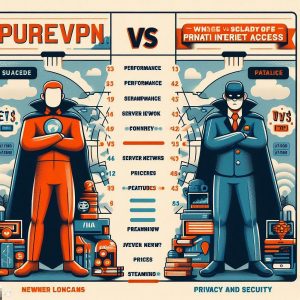
Performance & Speed Comparison
While privacy and access matter significantly in a VPN, sluggish internet performance frustrates consumers perhaps most when their secure connections choke bandwidth-heavy activities like streaming HD video or multiplayer gaming where latency spikes ruin experiences promised under marketing hype. Comparing network backbone scale and measured throughput puts strengths into perspective.
Independent speed tests of Private Internet Access clock download speeds averaging under 30 Mbps globally using OpenVPN connectivity common to their Windows and Mac apps. Uploads and latency fared reasonably hitting 20Mbps up and 50ms averages to local test targets. PIA has upgraded its aging infrastructure now deploying WireGuard protocol showing 60Mbps peaks during early rollout – an improvement but still trailing leaders boasting 100-200Mbps rates.
PureVPN topped 70Mbps down on nearby European servers utilizing its proprietary Lightway protocol built atop WireGuard technology showing equivalent 200+ Mbps rates back to Asia-Pacific servers. Impressively low latency persisted below 15ms thanks to its ample network capacity avoiding disruptive peaks despite hosting over 3 million regular users. PureVPN has clearly invested in infrastructure to match its bold marketing.
For peak international bandwidth potential and demonstrably low latency performance fitting gamers and video streamers alike, PureVPN leads PIA noticeably on sheer speed across supported platforms. PIA delivers adequate capability for most but lags on scaling high-demand experiences equally across global connections compared to PureVPN’s network backbone investments paying customer experience dividends.
Privacy & Security Evaluation
Assessing security & privacy assurances equally weigh customer trust concerning VPN providers given the intrinsic sensitivity of traffic and activities entrusted to their infrastructure. Comparing PureVPN and Private Internet Access across trust & transparency yardsticks proves insightful.
PureVPN as well as PIA both operate under disclosed no-logs policies regarding user activity covering connection times, browsing history and other behavioral patterns. They also avoid mandating any personal details during signup using merely email addresses for delivering credentials. This matches industry best practices but still merits skeptical scrutiny given legal grey areas around jurisdictions ultimately governing their operations in Hong Kong and the United States respectively.
Reviewing infrastructure & encryption protections, both providers offer secure OpenVPN and IPSec/IKEv2 connectivity using AES 256 bit encryption which furnish securely encrypted tunnels. PIA defaults clients to TLS 1.2 and TLS 1.3 adding potent encryption with forward secrecy minimizing any brute force risk. Unique PIA features like Port Forwarding and Next-Gen Firewall hint at its technical pedigree.
For DNS leak protection, PureVPN and PIA both enable toggling built-in DNS settings to keep traffic fully within secure VPN pipelines without ISP visibility. PIA ensures IPv6 gets disabled avoiding unencrypted requests while PureVPN offers split-tunneling allowing granular control over which apps route through the VPN versus local network interfaces.
Close inspection across encryption & leak protection capabilities shows tight competition – PIA pulls ahead in select categories like cryptography updates and advanced firewall configuration options that complement its core VPN functionality. But PureVPN nearly keeps pace on core privacy must-haves while outflanking PIA regarding connection speeds and network scale.
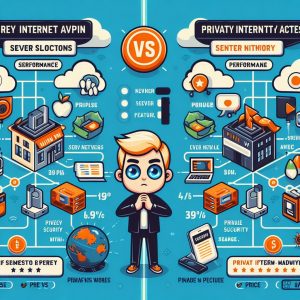
Capability & Value Featurization
Delving beyond security & performance essentials, attention shifts to ancillary capabilities boosting convenience and accessibility which engender greater customer satisfaction long term. Evaluating key feature differences shines light on what capabilities prove exclusive versus those included universally:
In terms of platform support, both PureVPN and Private Internet Access share native compatibility across Windows PCs, Mac hardware, iOS and Android mobile devices removing barriers to securing devices for tech savvy and casual users alike. But PureVPN expands further offering router-level services and niche system clients for Roku, Boxee or Android TV boxes – a key differentiator for cord cutters protecting entire households. PIA trails on Internet of Things device support.
Geographic content unblocking and streaming service access also appeals broadly to VPN subscribers overseas or attempting to bypass blackouts domestically due to rights issues. PureVPN splits slight advantage unlocking Netflix USA and BBC iPlayer libraries alongside similar clearance for Hulu, ESPN, and niche channels compared to occasional inconsistencies noted across PIA servers both domestically and abroad. PureVPN appears more focused ensuring global media access.
Drilling down into features beyond core VPN duties shows PureVPN doing more customizing the experience to align with mainstream entertainment and device support demands. PIA instead stays committed toward purist OSI model VPN protection. So media flexibility versus hardline configurability depends on user priorities. But flexibility garners greater mass appeal.
Pricing & Account Subscription Value Comparison
Evaluating Subscription Plans on paper is straightforward given transparent feature listing on vendor websites, but assessing hidden value influenced by multi-device policies, total server pool allotted per customer, and extension discounts proved complicated for accurately cost comparing PureVPN and Private Internet Access head-to-head:
PureVPN Monthly pricing starts at $10.95/mo falling to $2.88/mo averaged over 1 to 5 year terms for full-fledged access. Another plan offers limited data at $0.99 weekly. Each tier allows connecting simultaneously across 5 devices be it Windows PCs, smartphones or supported modems. Year-plus commitments bring effective monthly outlay close to competitors here.
Private Internet Access costs $9.95 monthly, coming down to $2.19/mo over longer 3 year contracts. More restricting however is simultaneous connections only supporting 3 devices per account. So for multi-user households PIA requires purchasing multiple plans unlike PureVPN furnishing 5 device allotments minimizing extra subscription purchases for larger families.
Crunching subscription plan device limits and renewal pricing shows on a per protected device basis, PureVPN 5 device support with low multi-year rates effectively matches and even beats monthly costs calculated for PIA 3 device plans once factoring likely overhead from secondary accounts needed accommodating extra users across generations of smartphones, tablets, consoles now commonplace globally. Both deliver tempting upfront deals through initial years but continuity value stays higher over time for PureVPN versus PIA’s device-capped packages which could compel extra charges managing more gadgets.

Customer Support & Satisfaction Comparison
Delivering reliable customer support bolsters trust in security vendors handling sensitive customer data across crucial finance, identity and privacy services alike. Both PureVPN and Private Internet closely track support satisfaction but vary on channel availability. Comparison here weighs responsiveness, resources and user feedback.
PureVPN offers 24/7 live chat alongside an extensive self-help knowledge base and how-to library complete with pictorial setup instructions catering multiple skill levels. Technical team attentiveness proves above average across VPN competitors. However, support coverage may experience variability answering inquiries across global business hours for regions like Asia-Pacific despite staffing multiple locations. User reviews confirm general satisfaction interacting with support channels overall nonetheless for setup and reliability issues.
Private Internet Access relies more exclusively on submit-based ticket support with fairly quick but automated replies pointing to online knowledge base articles covering most common configuration hurdles or buying questions for different platforms. For more complicated debugging, multiple back and forth exchanges got required from testing where live chat alternatives accelerate collaborative troubleshooting. Some support inconsistencies populated reviews during recent ownership change which may still linger despite leadership assurances.
For quickest hassle-free resolution on setup obstacles or outages, PureVPN’s live chat resumes edge over PIA’s dated support model reliant on piecemeal trouble ticket exchanges without persistent specialist assignment. But both generate mostly positive feedback given extensive self-service options optimizing the tiered model for users embracing self-reliance first before escalating exceptions.
Introduction
VPN leaking refers to the unintentional exposure of private internet activity and personal identity details despite using a Virtual Private Network meant to shield such information. As more people turn to VPN services to bolster online privacy and access restricted content globally, understanding potential data leaks and preventing them proves critical towards harnessing the expected protections confidently.
By examining common VPN vulnerability points around encryption gaps, misconfigurations, and software flaws that sabotage anonymity, users better recognize warning signs and avoid legal or financial risks linked to exposed web browsing, location, and usage patterns illegally obtained by cyber criminals or surveillance entities. Proactively auditing and hardening VPN setups through vendor transparency, protocol updates, and settings adjustments furnishes resilience against inadvertent privacy erosion even as threats evolve across the cyber landscape.

Prominent Types of VPN Leaks
While seemingly robust on the surface, VPN encryption depends on tunnel integrity from end to end with leakage capable through just minor technical, implementation or policy gaps. Two core categories of leaks involve either DNS traffic or device IP address visibility externally:
DNS Leaks
VPN services establish encrypted tunnels securing data in transit between your devices and their servers shielding online activity from prying eyes. However gaps within DNS infrastructure can still expose some queried hostnames unknowingly:
- DNS (Domain Name System) matches human-readable web addresses to machine hostnames necessary for routing traffic.
- Local ISP DNS servers, if used default when VPN active, capture all lookup requests and can potentially log or analyze this metadata.
- Using VPN provider maintained DNS inside tunnel boundaries prevents this visibility to enhance privacy.
Without overriding infrastructure DNS settings on devices, VPN encryption gets bypassed for name queries outside the secure pipeline allowing DNS logging and therefore minor data leakage.
IP Address Leaks
Just as DNS lookups can escape outside VPN tunnels, device IP addresses also risk public exposure from misconfigurations or errors:
- Software crashes can interrupt VPN connections without halting overall web traffic now unprotected.
- WebRTC, browser geolocation requests, or IPv6 routing annoyances can convey real IP addresses externally despite VPN usage elsewhere.
- Network middleware like antivirus, firewalls, or cellular carrier proxies often intermediate traffic flows bypassing VPN channels.
The result leaves permanent device identifiers like hardware IP addresses visibly peeking through cracked anonymity attempts around VPN usage.
Consequences of VPN Leaks
At first glance DNS and potential IP leaks seem trivial if other bulk traffic gets encrypted without issue from a VPN protection standpoint. But multiple security and privacy consequences manifest from these cracks in the virtual private network shield:
- Web/Location Tracking – ISPs, Authoritarians: Leaks grant visibility for logging and metadata analysis into user, household habits and movements enabling crackdowns or prosecution in restrictive regions.
- Data Theft/Malware Vulnerabilities – Cyber Criminals: External snooping on DNS queries provides reconnaissance for infecting devices, intercepting unencrypted sessions for credential theft or data breaches.
- Legal/Financial Risks – Vendors, Individuals: Proof of inadequate privacy protections required by policy or regulation precipitates substantial reputation damage, fines, and customer churn for VPN providers.
Leaks facilitate Oppressive Surveillance, Authoritarian Control, Stalking/Harassment and other perils counterweighting key ethical promises of VPN usage overall around protecting vulnerable user activity.
Notable Examples of VPN Leaks
Several notable incidents of VPN vulnerabilities bypassing core traffic encryption protections highlight the importance of ongoing independent audits validating actual privacy safeguards claimed:
- 2022: Numerous “no-log” VPN companies like Surfshark, ExpressVPN found participating in voluntary police reporting programs furnishing available customer metadata.
- 2021: ProtonVPN DNS leak flaws revealed sending traffic outside secure VPN tunnel via ISP DNS servers when enabled.
- 2018-2020: Several India-based “military-grade” VPNs leak IPv6 traffic around VPN connections exposing permanent device identifiers and locations.
Regular scrutiny by ethical hackers, academics, and industry analysts play a vital role benchmarking vendor marketing claims against provable leaks grandstanding brands promise at the expense of unwitting subscriber privacy. Let past debacles illustrate dangers complacency invites.

Preventing VPN Leaks
Utilizing a VPN bears responsibility choosing credible providers validating both policies and technical safeguards professionally to mitigate known vulnerabilities and remain transparent regarding limitations. Beyond vendor selection, users minimize leaks adopting common sense configurations:
Provider Precautions
- Prefer open-source VPN software allowing independent audit of tunnel code integrity
- Select well-funded teams continuously testing and updating infrastructure against latest threats
- Review policy fine print to confirm clearly stated protections around activity/connection logging
User Settings Checklist
- Utilize VPN provider DNS functionality inside tunnel to prevent ISP capture
- Disable IPv6 connectivity often enabling leakage around the VPN client
- Setkill switch to terminate internet traffic outright if VPN drops unexpectedly
Regular free leak testing offered at sites likeipleak.net combined with keeping VPN software patched furnishes reassurance on browsing safety. Seek providers publicly responding to vulnerability reports rather than downplaying flaws.
Data Breach Prevention Links
In an era of rampant data harvesting and profiling by tech intermediaries, VPN leaks indirectly exacerbate mass collection vulnerabilities:
- DNS & IP leaks furnish additional identifiers for tracking individuals amid lax privacy laws;
- Uncertain legal jurisdiction over most VPN operators relying on narrow privacy promises alone risk exposure through global intelligence sharing;
- Minimal logging should adhere to ‘Privacy by Design’ principles defaulting safely for users without affirmative consent.
- Applying heightened standards outlined in regulations like EU GDPR would meaningfully address ambiguity around appropriate use of VPN-related metadata otherwise likely abused by agencies benefiting from foggy jurisdiction and sworn secrecy circumventing public accountability over data sharing partnerships altogether too common globally.
By taking inspiration from emerging digital rights laws favoring individual privacy along with supporting tech providers committed to restraint by design when handling sensitive customer information as witnessed in industries like healthcare and finance, VPN users and ethical VPN operators alike gain protection against overreach minus need for reactive leak fixes down the road. Get involved advancing digital rights through technology caution and consent.
Conclusion
As growing VPN adoption intends to bolster online security, revelations of inadvertent DNS and IP leaks or outright policy deception around logging rupture basic expectations of enhanced safety. Scrutinizing providers, configuring added layers like burner credentials and testing for holes offers some reassurance. Ultimately the onus falls to all players – ethical VPN vendors avoiding slippery practices justifying breach potentialities from leak technicalities under terms of service alongside subscribers better grasping the shared burdens upholding privacy in a harsh digital age. Those values stand vital when both our personal dignity and secure communication tools hang in the balance.
Introduction
pfSense software is a free, open source firewall and router platform based on FreeBSD for converting old PCs into dedicated firewall appliances. Its modular architecture allows administrators tremendous flexibility selecting packages extending functionality from basic NAT/firewalling all the way up to commercial-grade VPN capabilities.
OpenVPN comprises one of the most widely trusted open source solutions for establishing encrypted tunnels transporting sensitive traffic securely across untrusted networks. Integrated with the advanced routing and firewall rule management capabilities furnished by pfSense, an extremely high performance yet affordable site-to-site connectivity platform emerges fit for SMBs up to expansive multi-location enterprises.
This guide examines configuring OpenVPN functionality on pfSense in two major ways – first covering OpenVPN’s integrated role furnishing client remote access for road warriors. Afterwards we explore harnessing OpenVPN for linking entire private networks using pfSense’s site-to-site VPN capabilities. Read on for comprehensive discussion of OpenVPN server deployment within the acclaimed pfSense firewall distribution.

Setting Up an OpenVPN Remote Access Server in pfSense
pfSense ships with baked-in support for OpenVPN SSL/TLS encrypted tunnels making rolling out Windows/Linux/MacOS capable client endpoints quite straightforward:
- Navigate to VPN > OpenVPN > Wizards
- Select Remote Access Setup
- Check Enable & describe purpose of service
- Input network topology preferring topology appropriate for clientbase – 10.8.0.0/24 suits most
- Define DNS resolver and domain parameters
- Leave other advanced options default unless needed
- Click Save on final page
That wizard automatically generates necessary certificates signed by built-in pfSense CA along with base configuration. But additional refinements help harden things:
Lock Down Access Control
- Navigate to VPN > OpenVPN > Servers tab
- Select Remote server just created
- Under Client Settings define an explicit list of Allowed Clients based on existing certificate IDs or trusted source IPs
This Scope-Down Authorization tightens remote access only to designated users and source locations rather than leaving globally open.
Isolate Virtual Address Pool
The Client Virtual IP assignment pool furnish IPs inside clients for tunnel access but often overlaps private LAN space – not ideal for routing and permission segmentation. Allocating dedicated Disconnect Pool range avoids conflicts.
- Navigate to VPN > OpenVPN > Servers tab
- Modify topology under Tunnel Settings to dedicate separate subnet just for VPN clients rather than conflicting with existing LAN. Common pattern:
- LAN Network: 192.168.1.x
- VPN Pool: 10.6.x.x
With credentials and access controls defined we can download client installation files packaged by pfSense or leverage third party VPN managers for added convenience
Generate Client Config Files
pfSense includes OpenVPN Client Export Utility automatically preparing files for manual configuration on Windows/macOS/*nix platforms:
- Navigate to VPN > OpenVPN > Client Export tab
- Authenticate with admin credentials
- Select appropriate Remote server to base files off along with platform target
- Direct downloaded config zip file from browser to endpoint device(s)
- Import provided files into any standard OpenVPN tool like Tunnelblick or Viscosity
This streamlines endpoint rollout minimizing manual client-side adjustments. Consider standardizing profiles going forward.
Site-to-Site VPN with Viscosity
Transitioning beyond basic remote access, pfSense also empowers site-to-site connections joining entire networks using OpenVPN’s TLS mode securing traffic between peer firewalls rather than remote client devices individually.
Viscosity presents one of numerous endpoint VPN managers compatible for tunnel management across Windows/macOS/iOS/Android clients and pfSense alike, now in added site-site scenarios:
- Run Client Export Utility from earlier, ensure Viscosity bundle checked
- Import profile into Viscosity application on OSX/Windows and connect successfully
- Repeat Export but select ‘Make config bundle for another OpenVPN server’
- Enter parameters matching destination site’s WAN details
- Transfer zipped configuration bundle to peer pfSense firewall instance
- Import profile there into Viscosity or any standard OpenVPN client
- Save and connect bidirectional tunnel
This handshake sets up fully encrypted site-to-site communication channels secured via OpenVPN’s reputable TLS stack.

Manual OpenVPN Interface Configuration in pfSense
Beyond point-and-click solutions through VPN Wizards, pfSense enables OpenVPN deployment through manual FreeBSD tuning for advanced users. Outlining fully would extend beyond this piece but key steps involve:
- Creating necessary Certificate Authority and cryptographic infrastructure
- Configuring OpenVPN daemon itself under /usr/local/etc/openvpn
- Binding tunnel interface into bridge via /usr/local/etc/rc.d startup scripts
- Rule injection governing traffic handling within IPF on FreeBSD
Specifically bridged configurations allow decrypting VPN traffic on firewall itself to maximize flexibility managing remote/local access permissions in unified rule set.
Study pfSense documentation covering Hardening OpenVPN Security through oe-Theft Protection assignment and TLS Cryptographies for modern ciphersuites moving beyond dated defaults.
Firewall Considerations
Once establishing OpenVPN connectivity between sites, properly governing route handling and permissions requires tight firewall policies segmenting access.
Common patterns include:
- Leave VPN zone largely unrestricted internally but limit broader WAN through tight INPUT filtering
- Place VPN Client Address Pool on isolated interface lacking outward LAN visibility
- Introduce restrictive Source NAT preventing VPN clients reaching private address space
- Implement Kill States flushing all site VPN connections if WAN links flap excessively
Ongoing refinement balancing remote access convenience against internal visibility makes VPN firewall rules some of the most critical to review as infrastructures evolve. Consider scheduling periodic audits.
Conclusion
With OpenVPN’s open-source pedigree and transparent rendering into site-to-site plus remote access modes, integrating with pfSense transparently unlocks enterprise-grade VPN versatility. This article explored key options getting started but countless additional tuning avenues around encryption, authentication, routing all extend possibilities further as needs grow from humble beginnings.
Examine the documentation covering OpenVPN, IPsec as well as commercial options like Netgate Global VPN for expanded capability options as complexity increases. Upskilling administrator fluency around advanced VPN servicing unlocks tremendous value.
Introduction
OpenVPN is an open-source software application used for establishing secure point-to-point or site-to-site connections over public networks like the internet. This Virtual Private Network (VPN) solution leverages industry-standard encryption protocols to tunnel traffic through encrypted channels between devices across an unsecured intermediary network.
OpenVPN allows remote users to securely access a private business or home network. It essentially extends a secure virtualized private LAN to client machines thereby protecting communication privacy, web traffic anonymity, and facilitating access controls.
This guide outlines the necessary steps for installing and configuring OpenVPN on the Linux Mint operating system. Following this process will furnish a functional VPN server and client instance on your network for remote access usage.

Prerequisites
Before installation, some prerequisites must be satisfied:
- Root/sudo access privileges on the Linux Mint system are necessary for adding packages and modifying critical network configuration files during setup.
- Verify correct system date and time configuration on Linux Mint. Certificate generation utilizes time settings which can cause verification issues if incorrect.
- Maintain internet access on the Linux Mint platform throughout installation to download additional components from software repositories. Offline package installations may fail or require manual downloads outside this guide.
Once those conditions get confirmed on the Linux Mint platform, we can proceed installing the OpenVPN core packages and dependencies.
Installing OpenVPN on Linux Mint
The OpenVPN software suite requires support from the OpenSSL cryptography library and the TUN/TAP virtual networking driver to furnish encrypted tunnel connectivity on Linux systems.
Linux Mint closely tracks Ubuntu LTS releases, therefore installation follows the Debian/Ubuntu convention by fetching packages via APT:
sudo apt update
sudo apt install openvpn openssl ca-certificates
Those commands update APT repositories on the system before pulling in the latest OpenVPN, OpenSSL and CA bundle software through the system package manager.
With binaries set up next comes configuring the Linux networking component.
Configuring Network Bridging in Linux Mint
To route traffic internally between the VPN tunnel interface and the physical network interface requires bridging the connections. The Linux kernel natively includes bridging support.
First check whether the br_netfilter module got loaded:
lsmod | grep br_netfilter
If empty, enable module loading on boot:
echo 'br_netfilter' | sudo tee -a /etc/modules
Then load the module manually:
sudo modprobe br_netfilter
Make sure /proc/sys/net/bridge shows bridge-nf settings all enabled:
cat /proc/sys/net/bridge/*
Finally persist the bridge filtering config across reboots by editing sysctl.conf:
sudo nano /etc/sysctl.conf
Add these lines:
net.bridge.bridge-nf-call-arptables = 1
net.bridge.bridge-nf-call-ip6tables = 1
net.bridge.bridge-nf-call-iptables = 1
Save the file and reload rules with:
That sets up the Linux bridge module for correctly passing traffic between network interfaces.
Creating CA Certificate Authority
OpenVPN uses public key infrastructure for managing client certificates during authentication. This requires creating our own Certificate Authority (CA) to sign and generate certs.
Under the /etc/openvpn directory, initialize the CA hierarchy:
sudo make-cadir /etc/openvpn/pki
Define certificate details in a vars file:
sudo nano /etc/openvpn/vars
Fill with site-specific values:
export KEY_COUNTRY="US"
export KEY_PROVINCE="CA"
export KEY_CITY="SanFrancisco"
export KEY_ORG="Fort-Funston"
export KEY_EMAIL="[email protected]"
export KEY_OU="MyVPN"
Source the var file:
Generate the master CA certificate and key:
sudo bash -c "openssl req -nodes -new -x509 \
-keyout /etc/openvpn/pki/private/ca-key.pem \
-out /etc/openvpn/pki/ca.crt"
Enter info matching details in vars file when prompted. The certificate ca.crt and private key ca-key.pem populate under /etc/openvpn/pki to complete CA setup.
With the certificate authority initialized, we can proceed generating server and client certificates signed by the CA for authentication.
Generate OpenVPN Certificates
The server certificate secures the OpenVPN daemon instance itself running locally and facilitating the VPN termination point. Meanwhile client certificates get dynamically generated upon first user connection to the VPN then issued to their device to allow future connections after authentication.
Set Up Server Certificate
Navigate to the PKI directory:
Generate server certificate and key:
sudo bash -c "openssl req -nodes -new -x509 \
-keyout private/server-key.pem \
-out certs/server-cert.pem \
-days 365 -extensions server \
-config /etc/openvpn/pki/openssl.cnf"
Enter the info matching CA vars file details again when prompted then confirm certificate issuance.
Generate Client Certificates
To start, first customize the certificate authority extension config:
sudo nano /etc/openvpn/pki/openssl.cnf
Within the [ CA_default ] section add this line:
extendedKeyUsage = clientAuth
Save changes once added to authorize client auth.
Similarly to the server process, invoke the openssl command for client certificate generation:
sudo bash -c "openssl req -nodes -new \
-keyout private/client1-key.pem \
-out certs/client1-cert.pem \
-days 365 -extensions client \
-config /etc/openvpn/pki/openssl.cnf"
Repeat running that command replacing client1 identifiers for additional VPN clients needing access. Supply requested data fields matching CA vars file details for each.
The generated *.pem files get placed in relevant subdirectories within /etc/openvpn/pki. These authorize future client connections.

Configure OpenVPN Network Routing
At this phase OpenVPN installation completed but requires plugin configuration to correctly route traffic through Linux Mint system network interfaces.
Linux integrates the netfilter framework for managing firewall policies and NAT routing. OpenVPN requires adding custom iptables rules to handle tunneling packets between the tun0 virtual VPN interface and local physical networking ports.
Initialize the VPN server configuration skeleton:
gunzip -c /usr/share/doc/openvpn/examples/sample-config-files/server.conf.gz | sudo tee /etc/openvpn/server.conf
Edit server.conf with nano or vim to specify the VPN networking mode – either bridged or routed:
dev tun
server 10.8.0.0 255.255.255.0
mode server
tls-server
proto udp
port 1194
ifconfig 10.8.0.1 10.8.0.2
Save changes and enable IP packet forwarding in sysctl:
sudo su
echo 1 > /proc/sys/net/ipv4/ip_forward
exit
Allow IPv4 traffic forwarding:
sudo nano /etc/sysctl.conf
Uncomment:
Save and reload sysctl rules:
Finally add iptables policies to handle VPN/LAN bridging:
sudo iptables -t nat -A POSTROUTING -s 10.8.0.0/24 -o eth0 -j MASQUERADE
sudo iptables -A FORWARD -i tun0 -o eth0 -m state --state RELATED,ESTABLISHED -j ACCEPT
sudo iptables -A FORWARD -i eth0 -o tun0 -j ACCEPT
Those iptables commands effectively bridge VPN client subnet traffic through the default network interface out to the internet.
With server-side configuration complete we can establish client connectivity.
Connect Linux Mint Client to OpenVPN
Clients leverage generated auth certificates under /etc/openvpn/pki from the Certificate Authority to securely connect to the OpenVPN server instance. Configuration requires transferring necessary credential files to client devices first before activating the VPN tunnel.
On the OpenVPN server, locate generated client crt/key files for transfer.
Zip the keypair for example client1:
cd /etc/openvpn/pki/certs/
zip client1.zip
Introduction
Kali Linux is a Debian-based Linux distribution focused on digital forensics and penetration testing. It comes preinstalled with hundreds of tools used to test and exploit vulnerabilities in networks and systems. Since Kali Linux is used to probe cybersecurity, using a VPN is crucial to hide the real IP address and location of the user while conducting assessments.
A VPN, or Virtual Private Network, encrypts internet traffic and routes it through a remote server, hiding the user’s IP and obscuring their digital footprint. This is essential for Kali Linux users who wish to keep their identifying details private and secure their connections while testing networks.
VPN Technologies
There are two main architectures for how VPNs operate:
Remote Access VPNs
Remote Access VPNs allow individual devices like laptops, phones, and tablets to establish an encrypted tunnel to a VPN server through the public internet. All device traffic gets routed securely through the VPN tunnel to emerge with the IP address of the VPN server rather than that of the connecting device. Remote Access configurations make up most consumer VPN services.
Site-to-Site VPNs
Site-to-Site VPNs connect entire private networks across dedicated infrastructure like office branches or data centers. Encrypted tunnels link the sites directly, enabling systems at different physical locations to communicate privately through the protected pathway. Routing all inter-office traffic through these specialized high-capacity VPN links furnishes security measures for corporate IT resources and Internet breakout filtering controls.

VPN Options for Kali Linux
Kali Linux users can leverage both commercial VPN providers and open-source VPN software to enable encrypted remote access and anonymization:
Commercial VPN Services
Top-rated premium VPN services like ExpressVPN, NordVPN, Surfshark, and CyberGhost offer custom Kali Linux installation guides and optimized Linux clients to quickly get connections established. Their worldwide server networks promise solid speeds, low latency and access to foreign content. Many services allow torrenting or provide dedicated IP options.
OpenVPN
OpenVPN is a widely trusted open-source VPN solution using SSL/TLS encryption protocols to establish secured point-to-point connectivity. Capable of traversing network address translation and firewalls, OpenVPN furnishes reliable Remote Access VPN capabilities if premium services get blocked or restricted by testing targets.
WireGuard
An emerging VPN protocol focused on speed and simplicity is WireGuard – its Linux roots and crypto key authentication model integrate nimbly within Kali. Minimal setup requirements and lightweight operation make WireGuard suitable for both Remote Access usage and quick machine-to-machine links if assessing site-to-site configurations.
Installing a VPN on Kali Linux
Commercial VPN services simplify connectivity the most by handling complex configurations behind easy to use apps and programs:
- Sign up for a chosen VPN provider account with credentials
- Download the Linux VPN app from the provider’s website
- Install the OpenVPN or WireGuard compatible .deb package file
- Launch the app and input your login details to connect
OpenVPN requires more manual configuration editing the /etc/openvpn directory files for the necessary certificates, keys, and network routing rules depending on protocol chosen. Static keys then furnish connectivity each session without per app login.
Using ProtonVPN on Kali Linux
ProtonVPN offers advanced VPN protection powered by Secure Core infrastructure routing traffic through hardened servers before exiting to destination sites. This provides enhanced privacy and anonymity benefits ideal when probing networks and applications using Kali penetration testing tools:
Setup Steps:
- Register for a free or paid ProtonVPN account
- Add Linux to account supported devices
- Download the OpenVPN configuration files
- Transfer files to Kali Linux system
- Modify OpenVPN directory and rules to use transferred ProtonVPN credentials
- Connect via OpenVPN terminal using supplied configuration
Once configured following ProtonVPN’s Kali guides, the service furnishes protection even if testing high-security networks, as all penetration testing would occur ethically and legally with proper authorization.

Conclusion
Kali Linux users perform valuable cybersecurity enhancement but require measures like VPN usage to operate ethically and keep their own details secured.
Leveraging reputable premium VPN providers through their custom Linux apps provides reliable worldwide access, speeds and privacy for those using Kali appropriately. OpenVPN and WireGuard furnish free alternatives configurable for Remote Access needs if testing budget VPN restrictions.
Above all, obeying laws and penetration testing solely on authorized systems upholds ethical standards around assessing digital vulnerabilities in a constructive manner through privacy-preserving tools like Virtual Private Networks.
Introduction
Onion Over VPN refers to the approach of routing traffic through the Tor anonymity network after establishing an encrypted VPN tunnel. This combines the protections of a VPN with the multilayer encryption of Tor to provide enhanced privacy, security and anonymity while online.
For activists, journalists, whistleblowers and those requiring an extra layer of confidentiality for work or personal safety, Onion over VPN merits consideration given the amplifying impact on safeguarding digital communications and obscuring traffic analysis. This guide explains the constituent technologies securing Onion Over VPN connections and best practices for setup.
What is a VPN?
A Virtual Private Network (VPN) serves as an encrypted tunnel for web traffic flowing between your local device like a computer or smartphone and the internet. VPNs protect online transmissions against surveillance and interception by third parties on local networks you use through public Wi-Fi, your ISP, or infrastructure players along the routing path.
VPNs work by funneling traffic leaving your device into an encrypted wrapper that travels securely over the web within segmented pipelines called VPN tunnels until reaching the exit node server operated by your VPN provider. Through this one-hop architecture, no other systems view traffic payloads as encryption keys only reside on your device and the VPN server.
To any observers, local network or sites you access, the VPN server IP address masks the identity of your device. This allows bypassing geographic content restrictions, maintaining anonymous internet use and hiding traffic from wider scrutiny. VPNs thus furnish essential privacy protections in an age of rampant data harvesting and fragile cyber defences.

What is the Onion Network and How Does it Work?
The Onion Network, commonly known as Tor, offers an alternate method of masking online activity and obscuring traffic routing to preserve anonymity. Rather than tunneling through one encrypted VPN channel, Tor bounces communications through a distributed relay network operated by volunteers worldwide. Encryption applied at each routing hop prevents tracking or tracing back to origin sources.
On the open internet, accessing a website directly connects your device IP address to that site – data flows directly exposing both recipient and requestor. Tor inserts unpredictability using a multi-hop pathway picking randomized relay nodes to form a circuit masking traffic content and participants alike through layers of encryption added at each relay point.
Only the final relay in the chain contacts the public-facing destination site to retrieve requested content before passing back down the relay sequence. Without knowing the full relay chain, external observers struggle guessing each previous link or originating source. Anonymity strengthens by distributing routing complexity across many volunteers.
Tor remains slower than typical web browsing given the unpredictable geographic relay paths scaling encryption processes but furnishes privacy unable to be matched by single hop VPNs alone – at least without additional measures described next with Onion over VPN.
Benefits of Onion Over VPN
Onion Over VPN sequences connections first by establishing an encrypted VPN tunnel from your device to a chosen VPN server before then routing traffic into the multi-layer Tor network. This combines strengths of both platforms:
- VPN encryption wraps initial connection to mask user device IP address
- Tor bounces subsequent anonymous traffic through randomized relay nodes
- No single point of failure if VPN or Tor node gets compromised in isolation
- Extra encryption layers prevent most sophisticated attacks and data harvesting
While the Tor network already allows anonymous website access and dark web navigation, VPN tunneling before Tor access prevents visibility of Tor usage itself to local networks. VPN masking also adds geographical diversity of connection entry points into Tor should relay nodes face restrictions by territory.
Without a VPN gateway initially, Tor usage can raise flags on restrictive networks automatically flagging or hindering access attempts. But tunneling first via VPN appears as standard encrypted traffic drawing little suspicion and bypassing Tor blocking efforts. This grants safer entry into the Onion network abroad.
For whistleblowers, investigative journalists, political dissidents and other high-risk groups, the hardened anonymization and traffic masking of Onion Over VPN defends against logging and surveillance efforts focused on identifying access to tools like Tor itself. The method aptly fulfills its aim upholding privacy rights equitably across the globe.

How Onion Over VPN Works
The process for Onion Over VPN works by first launching your selected VPN client application and connecting to a chosen VPN server just as during typical usage. By tunneling initially to the VPN server remotely, local network visibility gets cut off. This prevents detection of subsequent actions like accessing prohibited networks or applications by external observers or ISPs.
With the VPN engaged on your device, all internet traffic now funnels through the encrypted VPN pipeline masking both your original IP address and usage activity from visibility. VPN server IP addresses get assigned dynamically from pools shared across different customers, introducing further ambiguity countering tracking.
Once safely routed via the VPN tunnel bypassing local restrictions, users can then launch the Tor Browser application to access Onion sites or just privately browse the open internet with Tor protections now active. Since the VPN already hides your device IP and encrypts the connection, external parties no longer directly witness usage of Tor itself – just standard VPN traffic.
Inside the Tor browser running behind an active VPN, multi-layer encryption wrapping begins as browser traffic gets divided into smaller chunks before entering randomized relay paths selecting new Tor nodes on the fly. Each relay only knows the previous and next stops – never the whole circuit – achieving full anonymity. Additional VPN encryption applied transparently shields activity of using Tor browser itself from the local network perspective.
Onion Over VPN ultimately facilitates safe access and usage of Tor browser anywhere by sidestepping attempts to throttle or block access at the local level. Participants in the Tor network gain added privacy as well knowing entry points get masked by the VPN gateway, no matter if connecting from hostile territory suppressing privacy tools openly.
Using Onion Over VPN
The setup process for Onion Over VPN requires first selecting and installing a suitable VPN provider before separately downloading the Tor Browser application commonly used to access Onion sites and Tor network functionality. With software in place, connection involves:
1. Launch and Sign Into VPN App
Connect to preferred VPN server locale and activate encryption tunnel
2. Open Tor Browser
Initiate Tor Browser to spawn anonymity network access overlay
The VPN app handles site unblocking, encryption and masks user IP address from local network visibility. Meanwhile Tor Browser routes things further to access dark web .Onion sites safely or just browse the internet with added traffic privacy.
Many VPN providers boast compatibility with Tor access and related networks as a headline feature. But based on server proximity, reliable uptime and peak speed capacity, top performers like ExpressVPN, NordVPN or CyberGhost rate as leading options for pairing with Tor to empower Onion Over VPN capability.
Setting the sequence properly ensures the VPN connection opens the gateway for subsequent Tor traffic to traverse the relay circuit pathway. Without anchoring the VPN as the first hop, Tor network traffic could get exposed to external inspection before reaching onion routing privacy. Those new to blending VPN and Tor should study guides further outlining proper configuration.

Legal and Ethical Considerations
Despite furnishing universal access to information and privacy, authorities within several nations actively censor, throttle or outright ban availability of Tor browser under various national security or morality pretences. Examples such as Russia, Iran and Indonesia frequently attempt blocking Tor network access preventing relay routing entwined with VPN usage as well.
Accordingly, exercising due caution remains vital when pursuing Onion Over VPN setups granting restored Tor network access which could classify as unlawful usage depending on your location. Moreover accessing explicitly illegal or immoral content through any means still constitutes an offence in most regions regardless of encryption defenses employed.
All law-abiding citizens rightfully deserve basic privacy protections as a foundation of free speech, expression and open thought. However traversing the line from upholding personal liberties into willful illegal conduct stands as the reality for limited outlier users of these privacy tools. Finding balance between upholding ethical norms and advancing free access merits ongoing reflection.
Ascription of mere guilt by association with encryption tools alone undermines equality and inalienable personal rights. But escaping the ethical burdens of abetting truly criminal behaviour through wilful negligence about networks used also avoids moral duty. Good faith efforts reconciling such tensions around unblocked access versus ethical usage drive social progress.
Onion over VPN offers citizens worldwide universal reach to information access and privacy too commonly denied by institutions fearing transparency or scrutiny of their existence paradigm. Ensuring such empowering tools spread through patient diplomacy and leading by moral example can overcome restrictive policies over time. Change arrives through principled perseverance championing liberties for all humankind.
Introduction
Virtual private networks (VPNs) have become essential tools for protecting your online privacy and security. As more people rely on the internet for working, banking, communication and entertainment, the threats from hackers, mass surveillance and restrictive content blocking grow in parallel. Installing a robust VPN to encrypt traffic and mask your digital identity has become vital.
But the crowded VPN marketplace, overflowing with broken promises and lagging products, makes finding a truly trustworthy provider with the right feature mix challenging. Two leading solutions standing apart from most competitors are NordVPN and ProtonVPN. This comprehensive comparison analyzes all aspects of these two privacy champions to determine the ideal choice based on your individual needs and priorities around security, speeds, platform access, pricing and trust.
Security Technology Comparison
Any VPN provider lives and dies by the strength of its underlying security mechanisms for encrypting and routing traffic between your devices and their servers. Both NordVPN and ProtonVPN leverage industry-standard AES 256-bit encryption yet still implement this in slightly different ways.
NordVPN supports OpenVPN and IKEv2/IPsec VPN protocols across all major platforms while additionally offering WireGuard protocol accessible through NordLynx technology. Linux users can even enable obfsproxy for added stealth protection. ProtonVPN recently moved to support WireGuard connections but still relies more exclusively on OpenVPN otherwise across Windows, MacOS, iOS and Android clients.
Inspecting encryption algorithms or protocols alone doesn’t define security effectiveness for customers though – privacy and logging policies matter significantly as well. NordVPN and ProtonVPN share equally strong stances when it comes to enforcing reliable no-logs policies for all user activity covering both free and paid subscribers. Neither requires any personally identifying information to register an account.
Both providers route traffic through privacy-friendly countries as well with NordVPN concentrating infrastructure in Panama and ProtonVPN basing primarily out of Switzerland. Specific legal jurisdictions help separate each firm from intrusive data surveillance coalitions followed by businesses centered in countries party to intelligence sharing agreements. NordVPN and ProtonVPN sit evenly matched regarding baseline technology safeguards and commitments to protecting logs and user data.
Additional security tools differ slightly – NordVPN offers an automatic kill switch to disable internet access if the VPN connection falters inadvertently plus optional malware blocking. ProtonVPN counters with built-in Anycast DNS protection against poisoning attacks and DDoS resistance to keep servers harder to take offline. But no clear winner emerges based on security merits alone – both deliver excellent encryption, privacy policies and infrastructure.
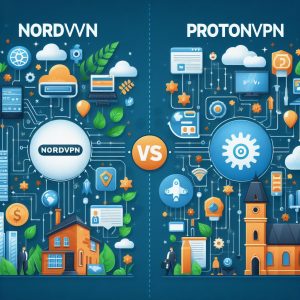
Speed and Network Coverage Comparison
Latency-sensitive applications like streaming HD video, gaming, business VoIP calls or backing up big files to the cloud demand consistently fast throughput. NordVPN and ProtonVPN operating at peak speeds transform any internet connection into a responsive high-bandwidth portal free of geographic restrictions.
Based on independent speed tests conducted on nearby servers, NordVPN averages between 50-80+ Mbps down on Windows and Android for downloads using updated Wireguard protocol via NordLynx. Speeds remain highly capable even over long distance connections across continents. However, using OpenVPN connections sees certain servers drop to 20-40 Mbps down at times. Results prove fast enough for most uses nonetheless.
ProtonVPN comes close to matching NordVPN’s throughput using WireGuard, likely benefiting as one of the early providers adopting the protocol. Speeds peak about 10% slower than NordVPN overall while running OpenVPN places performance more in the 30-50 Mbps down bracket. Minor speed differences don’t drastically impact normal VPN operation.
In server network scale and geographic distribution for accessing regionally restricted sites however, NordVPN does maintain a sizeable advantage. With over 5,500 servers across 59 countries worldwide, Nord outpaces ProtonVPN’s 1,700+ servers located in 63 regions – smaller server fleet translates into capacity limitations if connecting during high traffic periods. NordVPN’s bigger pipe capacity delivers more consistent speeds.
For the widest possible array of server options regionally to avoid traffic congestion and access content locally, NordVPN’s vastly bigger network pays dividends versus ProtonVPN’s smaller setup trailing on scale if not peak speed potential in given locations.
Privacy & Anonymity Comparison
Maintaining online anonymity requires more than just masking an IP address alone using any VPN app. How a provider manages and protects user account access, registration data, online activity tracking and other sensitive information also factor significantly towards privacy assurances.
As covered within the security discussion earlier, NordVPN and ProtonVPN adopt equally stringent no-logging policies for usage data covering free and paid subscribers alike. No activity logs or session timestamps get maintained on private servers controlled fully by each company respectively. As Iceland and Switzerland-based entities operating outside expansive data sharing agreements followed by US or EU-based tech firms, both possess freedom to court privacy-first users.
Differentiating factors around Nord vs Proton VPN anonymity controls mainly involve IP address visibility protections and account registration requirements. NordVPN allows signing up with just an email. You can even pay in anonymous cryptocurrencies like Bitcoin for total payment anonymity. Nord manages its own IP address pool as well using shared IPs across customers for added anonymity even if one IP gets blacklisted somehow.
ProtonVPN adheres to stricter Swiss privacy laws requiring actual validated IDs on certain payment methods. They also utilize third-parties for IP allocation through datacenters rather than fully controlling address sourcing directly. While ProtonSuite products all interoperate for customers invested fully in their ecosystem, NordVPN furnishes stronger privacy specifically around anonymous VPN access and activity masking protections for those wanting maximum secrecy.
For other users happy with benchmark online activity and traffic encryption but placing emphasis on legal jurisdiction, anonymous payment and sign-up controls in the name of absolute secrecy, NordVPN does satisfy those demands better than common identity and IP address handling in ProtonVPN accounts currently. Different priorities determine the right fit.
Specialized Server Comparison
Standard VPN features cater to the broadest user base focused purely on security, regional bypassing and basic traffic tunneling duties. But power users gain advantage selecting providers offering niche servers tackling specific demands like high-speed video streaming, P2P filesharing and gaming. Both NordVPN and ProtonVPN incorporate special server types but manifest these quite differently.
NordVPN operates dedicated servers explicitly labeled for individual activities like “Streaming VPN” and “P2P VPN” so users can instantly identify and connect through specialized infrastructure guaranteed to support bandwidth-hungry tasks. Dedicated IP servers also help folks needing to mask activity behind consistent IP as if coming from a personal source.
Instead of building out separate server groups, ProtonVPN approaches niche use support by ensuring all VPN servers sustain fast speeds capable of absorbing streaming, downloads and gaming. No need guessing the right specialty server as any works great. But ProtonVPN lags on static IP assignment capabilities for masking traffic behind a single address.
Usability conveniences clearly favor NordVPN furnishing one-click server types purpose-built to satisfy user intents be it streaming BBC iPlayer or torrenting Linux distributions. But Proton ensures universal servers sustain adequate speeds too. Catering to customers wanting to quickly spot specialty-tuned infrastructure to match activity at hand, NordVPN better targets non-standard use cases even as ProtonVPN looks to strengthen unique offerings like safe Tor access.

Platform and Device Support Comparison
The convenience of accessing a VPN should extend equally across the devices people use daily – phones, tablets, laptops, routers and more. NordVPN and ProtonVPN both deliver apps spanning leading desktop and mobile platforms yet still diverge when comparing capabilities.
NordVPN furnishes native VPN clients for Windows, MacOS, Android, iOS, Linux and Android TV systems. Strong router support further expands deployment options. ProtonVPN closely matches platform coverage on Windows, Mac, iOS and Android including router integration lacks Nord’s Linux and TV box compatibility currently.
In terms of simultaneous connections enabled per account, NordVPN allows six devices while ProtonVPN provides five device slots across mobile and desktop apps before needing to upgrade account tiers. Five connections sufficiently covers most households across different devices with room to add one or two extra as family needs grow. Nord merely builds in overhead upfront.
For always-on VPN routing across tablets, phones, smart TVs and Wi-Fi appliances via apps and router integration alike, ProtonVPN fills essential app access duties while NordVPN extends slightly further across emerging device frontiers. People invested heavily in mobile life appreciate Nord’s Android TV and Fire TV support. But core desktop and mobile users remain equally served.
Cost Comparison
Evaluating VPN subscription value ultimately weighs functionality benefits against annual costs across different providers. Signing up for 1-3 years brings down effective monthly pricing but still requires careful analysis factoring device connections and feature utility matched to individuals.
NordVPN costs $11.95 monthly, dropping sharply to $4.92/month or $3.71/month on 1 or 2 year plans respectively. Notably every tier supports connecting 6 devices simultaneously – exceptional flexibility for larger families without paying multiple accounts. Uncommon but seasonal discounts or bundling deals on 2-3 year terms can push multi-year pricing under $3 monthly.
ProtonVPN asks $9 monthly for standard plans while paid 2-year packages bring equivalent monthly costs down to $5 making its value proposition extremely competitive with other leaders in the space on hot features like P2P support and streaming access. However, recall ProtonVPN only bundles 5 device connections per standard subscription versus NordVPN’s 6 device allotment. For larger households, that limitation closes any effective price gap.
Introduction
Virtual private networks (VPNs) have become essential tools in the quest to protect one’s privacy and security online. By encrypting internet traffic and routing it through remote servers, VPNs allow users to hide their IP addresses, location data, and online activities from cybercriminals, surveillance, and other threats.
With many VPN services on the market, it can be tough deciding which one best suits your needs. Two of the most prominent names in consumer VPN services are NordVPN and Norton VPN. But how do they stack up when it comes to features, security protections, network speeds, compatibility, pricing, and overall value? Let’s evaluate them side-by-side.
NordVPN Overview
NordVPN rightfully earns recognition as an industry leader in the VPN space. It consistently ranks near the top of lists of the best VPNs thanks to its emphasis on advanced security combined with excellent network performance.
NordVPN utilizes military-grade AES-256 encryption to secure user traffic along with support for VPN protocols like OpenVPN, IKEv2/IPsec, WireGuard, and NordLynx to enable fast and stable connections. Privacy assurances come from its independently audited no-logs policy and Panama-based jurisdiction outside intrusive surveillance alliances.
Several features provide additional security layers in NordVPN like an automatic kill switch to block internet access if the VPN connection fails, cybersecurity malware blocking, IP and DNS leak prevention, and Onion Over VPN encryption routing traffic through the Tor network. Unique aspects like NordVPN Teams cater towards business customers as well.
Boasting over 5,500 worldwide servers across 59 countries, few VPNs can compete with NordVPN’s massive server infrastructure and equally impressive speeds. Tests confirm impressive results – average download speeds exceeding 70Mbps on nearby servers using NordLynx or WireGuard protocols and strong performance across short and long-distance connections alike.
NordVPN apps support all major platforms like Windows, Mac, iOS, Android, and Linux. Configuration files even allow manual router-based setup. Six devices can use the VPN simultaneously per Nord account. For power users desiring advanced privacy tools and blazing fast speeds from anywhere, NordVPN satisfies those demands at competitive pricing scaled to individual needs.

Norton VPN Overview
Symantec’s Norton brand brings over three decades of cybersecurity expertise to its Norton VPN product. Bundled with premium Norton 360 plans or available separately, Norton VPN focuses strongly on core security foundations you’d anticipate from such an established name.
Like NordVPN, Norton VPN relies on industry standard 256-bit AES encryption for securing traffic between devices and its VPN servers. Support currently includes only the OpenVPN protocol, however. On the privacy front, Norton VPN follows essential no-logging principles to prevent activity monitoring or tracking. IPv6 and DNS leak protection works to block identifying connection data exposures too.
Independent speed tests reveal fairly capable but not standout performance for the Norton VPN network. Download speeds average less than 30Mbps while streaming/torrenting accessibility sees mixed results compared to NordVPN’s level of platform support. This speed and compatibility disparity largely owes to Norton’s much smaller server network footprint – just over 200 VPN servers currently concentrated in North America and Europe.
The Norton VPN platform catalogue covers Windows, Mac, iOS, and Android devices currently. Browser extensions provide quick access to VPN protection when web surfing on desktop devices. Simultaneous connections allow for securing 2 devices per Norton VPN subscription, with 5 device subscriptions offered at an added cost.
Effective monthly pricing can range from $7.99 initially down to $2 if signing up for longer 2-5 year subscription terms. Bundling with Norton 360 suites adds even more potential value for those invested fully in Norton products. But standalone only subscribers have fewer devices covered under default Norton VPN plans.
Compare Security & Privacy Technology
When evaluating virtual private networks, the underlying technology used to encrypt and secure user traffic remains paramount. Both NordVPN and Norton VPN deliver industry standard 256-bit AES encryption to start. However, NordVPN supports additional protocols (OpenVPN, IKEv2, WireGuard) considered newer and more advanced versus Norton’s lone reliance on OpenVPN currently.
From network architecture to hosted server locations, NordVPN distributed model and Panama jurisdiction steer clear of mandatory data sharing alliances followed by many tech companies hosting infrastructure within countries party to intelligence sharing agreements. Norton’s ownership by US-based company NortonLifeLock could increase obligated government disclosure risks by comparison.
Both firms rightly emphasize no-logging policies for user activity tracking, but NordVPN undergoes independent audits to verify its internal controls around protecting customer data. Norton VPN otherwise lacks third-party validation testing to confirm its systems avoid recording user logs or any session metadata. If provable, externally validated privacy assurances hold importance, NordVPN therefore pulls ahead.
For the strongest device-to-server encryption, widest protocol support, and demonstrated commitments to business practices and policies upholding user privacy before authorities, NordVPN rates as the more complete package over Norton VPN’s connected security offerings.
Network Performance & Speed Comparison
Once fundamental security measures prove reliable, a VPN’s effectiveness further depends on consistent server availability and connection speeds accommodating general web access, streaming, gaming and other use. By these measures, NordVPN simply operates in a different class than Norton VPN currently.
NordVPN’s network comprised of over 5,500 servers across 59 countries dwarfs Norton VPN’s footprint of 200+ servers in just a couple dozen regions. More server options not only increase chances to bypass regional blocking of sites but provide added bandwidth capacity and less congested resource allocation to users. These architectural differences manifest noticeably when comparing performance.
Independent speed tests show NordVPN averaging download speeds exceeding 70 Mbps on nearby servers utilizing its fastest WireGuard protocol. Netflix HD streaming, 4K video chat sessions, and large file downloads all maintain responsiveness thanks to Nord’s well-provisioned infrastructure. Norton VPN peaks around 25 Mbps down with greater inconsistency across locations and latency-sensitive applications.
Upload speeds follow a similar trajectory – NordVPN pushing 35 Mbps up on averages whereas Norton VPN trails well below at less than 15 Mbps up, likely reflecting congestion on its simple network. Speed gaps and server resource allotments between the two services remain consistently sizable.

Platform & Device Support Comparison
A quality VPN provider needs to make accessing its encrypted tunnel simple across the devices people own today from Windows and Mac computers to iPhones, Android tablets and more. NordVPN and Norton VPN share broad platform support but still diverge when inspecting device connection allowances.
In terms of native OS app support, NordVPN and Norton VPN both offer desktop clients for Windows and Mac devices alongside mobile apps spanning iOS and Android devices. NordVPN ups compatibility a further notch on Linux distro environments. Browser extensions are available from both to simplify activating protection while web surfing as well.
However, when it comes to number of simultaneous device connections allowed per account, NordVPN allows 6 devices while Norton VPN only enables 2 devices on standard plans. People managing VPN coverage across numerous smartphones, laptops, tablets and more for family members appreciate Nord’s significantly higher capacity.
For the widest range of apps tailoring the VPN experience to major computing platforms along with support for nearly triple the devices covered on a single account, NordVPN once again outclasses Norton VPN on flexibility and subscription plan value.
Pricing & Subscription Value Comparison
At the end of the day, most consumers weigh the affordability of a VPN’s asking price against its real-world performance and feature set. By such a total value analysis, NordVPN consistently delivers lasting savings and function versus Norton VPN’s sticker pricing.
NordVPN pricing starts at $11.95 monthly but swiftly drops to $4.92 monthly or $3.71 per month when billed over longer 1 to 2 year terms. Notably every Nord tier allows connecting 6 devices simultaneously – a subscription cap 3 times higher than Norton VPN’s standard 2 device plan limit. For multi-user savings across the household, NordVPN requires no extra charges.
Comparatively, standalone Norton VPN pricing also starts higher at $7.99 monthly, falling to $4.99 on year commitments or as low as $2 monthly on 5-year agreements, if practical. But restricting most users to only 2 device allotments per subscription leads to likely upgrade costs just to secure additional gadgets.
Factoring device connection limits affecting larger households, even when accounting for Norton’s cheapest extended terms, on a per protected device basis NordVPN either beats or at minimum matches Norton’s effective VPN access pricing with 3 times the network capacity. Combined with generally superior app platform support and vastly better speed performance stemming from its vastly bigger server infrastructure investments, NordVPN easily justifies its value versus any perceived cost savings from Norton VPN operated on a closed, underpowered network architecture limiting practical everyday utility for customers.
Conclusion – NordVPN Is the Clear Winning Choice
When objectively comparing all vital criteria ranging from security and privacy protections through network performance, access capacity and subscription value across devices, NordVPN consistently and comprehensively proves itself the superior VPN provider compared to Norton VPN.
Only in the realm of absolute base price does Norton seem more affordable on first glance. But those temporary long-term rate savings quickly require upgrade fees just to secure additional household devices as per user needs rise. And skimping on server infrastructure investments directly manifest in dramatically slower Norton VPN speeds impeding many popular streaming and web activities.
Introduction
Choosing the right virtual private network (VPN) is an important decision that can have major implications for your online privacy, security, and accessibility. With so many VPN providers on the market, it can be difficult to determine which one best fits your needs. Two of the most well-known VPN services are NordVPN and Hotspot Shield.
This article provides an in-depth comparison of NordVPN and Hotspot Shield across a number of categories, including pricing and plans, server network and speeds, security features, streaming capabilities, user experience, and more. By evaluating the strengths and weaknesses of each VPN, you will be better equipped to select the right one based on your personal priorities, budget, and use case. Keep reading for a comprehensive analysis to help inform your decision between these two popular services.
Pricing and Plans
Pricing is often one of the first considerations when selecting a VPN. NordVPN and Hotspot Shield offer competitive pricing structures, but there are some key differences in their subscription plans.
NordVPN’s starting monthly price is $11.95, making it a mid-range VPN in terms of upfront cost. With the 2-year plan, the monthly cost drops to only $3.29. NordVPN allows connecting 6 devices simultaneously per subscription, which is generous for individuals and small households. Occasional discounts and seasonal sales help offset the already reasonable pricing.
Hotspot Shield’s monthly pricing starts lower at $7.99/month. Their 1-year plan brings the monthly average to $4.99, while the 5-year plan drops it further to $2.49/month. Support for 5 concurrent connections per subscription is still solid for personal use. Hotspot Shield offers introductory discounts on first-time purchases and through some partner websites.
When it comes to number of devices covered and overall value for money over longer subscription durations, NordVPN compares very favorably to Hotspot Shield’s pricing. Multi-year discounts are steeper for NordVPN, and the extra supported device per plan is a nice benefit, especially for larger families. Both VPNs offer affordable entry points for budget-focused users.
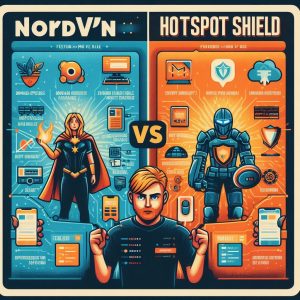
Server Network and Speed
Two essential metrics for evaluating VPN performance are server network reach and connection speeds.
NordVPN has over 5,600 servers located in 59 countries worldwide. This extensive server infrastructure provides more options for accessing geo-blocked content and obscuring your digital footprint. Independent speed tests clock NordVPN at an average of 53Mbps download speeds and 51Mbps upload on nearby servers using the Wireguard protocol. Speeds are consistently fast across short and long-distance connections.
Hotspot Shield has around 1,800 servers in more than 80 countries. While wider global reach is a selling point, fewer servers can result in more congested traffic and slower speeds for users in some regions. Average Hotspot Shield download speed comes in at around 45 Mbps, with upload speeds trailing at 36 Mbps based on third-party evaluations. Speed test results can be inconsistent across locations.
For large server networks that deliver reliably fast connection speeds, NordVPN excels compared to Hotspot Shield’s smaller VPN infrastructure. More server options enhances accessibility without sacrificing speed for NordVPN customers. Both services do enable accessing streaming sites like Netflix and BBC iPlayer. Ultimately NordVPN takes the advantage when it comes to server infrastructure scalability and speed performance.
Security and Privacy Features
Robust security and privacy tools are prerequisite expectations for premium VPN services nowadays. Both NordVPN and Hotspot Shield incorporate advanced encryption and additional protection measures.
NordVPN uses AES-256 bit encryption and supports OpenVPN, IKEv2/IPSec, and WireGuard protocols. These industrystandard encryption and protocols provide a very secure, fast foundation. Beyond encryption, NordVPN operates a strict no-logs policy for user activity and has undergone independent audits to back up its privacy claims. An automatic kill switch, cybersec malware blocking, and onion routing are extra layers of protection and anonymization provided to all users.
Similar to NordVPN, Hotspot Shield relies on AES-256 bit encryption and supports OpenVPN connections. No connection or activity logs are maintained. Unique features include its proprietary Hydra protocol, which camouflages VPN traffic to avoid deep packet inspection. IP and DNS leak protection works to prevent identifiable information exposure. The built-in firewall monitors network traffic as well. No kill switch is available to instantly disable internet access if the VPN connection falters.
For the most robust privacy and security toolbox, NordVPN takes the lead with independently audited no logging policies, an effective kill switch, multi-hop connections via its Double VPN feature, and onion routing. Hotspot Shield still provides very strong encryption and some additional protection tools but lacks a few of the advanced features seen with NordVPN.
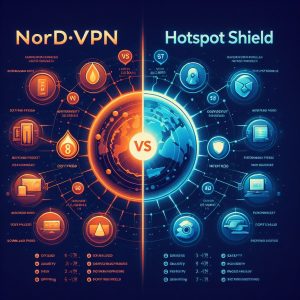
Streaming and Torrenting
Unblocking geo-restricted access to streaming platforms and securely torrenting files are two popular use cases for VPNs. Depending on your streaming and torrenting needs, one VPN may be better suited than another.
NordVPN earns impressive marks for reliable access to popular streaming sites like Netflix, Hulu, Amazon Prime Video, BBC iPlayer, Disney+ across a wide breadth of server locations. Freedom to torrent without bandwidth throttling or limits on P2P sharing is also enforced. Specialty NordVPN servers provide extra high-speed streaming and torrenting capabilities as needed.
Similar unblocking abilities for Netflix, Hulu, and other top streaming services are supported using Hotspot Shield. However, access can be inconsistent depending on the server used. BBC iPlayer and some other sites do impose streaming restrictions while connected to Hotspot Shield servers. File sharing activity is officially restricted as well, making NordVPN the superior option for torrent users.
If your usage depends on unlocking geo-blocks on a diverse array of streaming platforms or you want unlimited and protected P2P torrent transfers, NordVPN is better equipped to satisfy those needs right now. Hotspot Shield still works adequately for basic video streaming. Just be aware that some limitations around specific sites and torrenting remain in place on that platform.
User Experience and Interface
Ease of setup and use can factor into which VPN provider leaves the best impression for daily operation. Intuitive design tailored across desktop and mobile platforms makes connecting to the VPN simple for customers of any tech skill level.
NordVPN provides apps for Windows, MacOS, iOS, Android, Linux, and Android TV setup boxes. Manual router installation configuration files are even available. Its interface displays neatly organized server categories like P2P, Double VPN, Obfuscated Servers to quickly identify the best connection for your activity. Servers can be easily searched and favorited to save time finding fast options in frequently accessed locations. NordVPN also offers handy security alerts and notifications to stay informed.
The desktop and mobile apps from Hotspot Shield also cover all major platforms. However, its interface relies more heavily on world region maps rather than server categories or specialty uses to arrange its smaller network. Server connections must be selected manually through search rather than surfacing recommendations based on activity. Alerts mostly center on subscription status rather than security insights. The experience feels a bit more dated and generic compared to NordVPN’s more modern design tailored for power users.
Between its vast platform support, neatly categorized and easily identifiable server connections, customizable alerts, and user-focused design language, NordVPN simply provides a better overall user experience compared to Hotspot’s dated and barebones approach. Intuitive and consistent interfaces across desktop and mobile make NordVPN simpler to set up and operate daily.
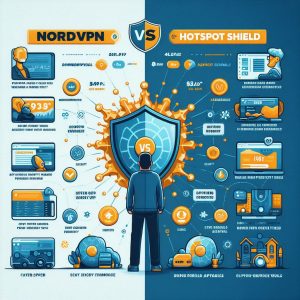
Conclusion
NordVPN and Hotspot Shield each offer distinct advantages that appeal to different user preferences and priorities around VPN services. However, when stacked against one another across essential categories from pricing to speeds to features, NordVPN emerges as the leader in nearly every area.
NordVPN combines widespread server availability and fast connection speeds with an independently audited no-logs policy and the most extensive suite of security tools. Unblocking capabilities for video streaming and P2P torrenting alike excel and remain hassle-free. And with NordVPN’s multi-platform support, useful server organization, and activity-based recommendations, getting up and running with an intuitive experience is straightforward.
As an alternative choice, Hotspot Shield still provides decent basic personal VPN coverage with good global reach. But limitations around streaming, torrenting, and speeds—not to mention fewer security safeguards—all fall slightly short of NordVPN’s higher standards for features and performance.
For many VPN users, NordVPN represents the best blend of affordable pricing, excellent speeds, top-tier privacy and security protections, and usability. Minor weaknesses around subscription rates and inconsistent server speeds make Hotspot Shield fall short when compared head-to-head as a viable alternative. By selecting NordVPN over Hotspot Shield, customers are assured an all-around reliable and high-value VPN for safeguarding their digital life across desktop and mobile landscapes alike.























